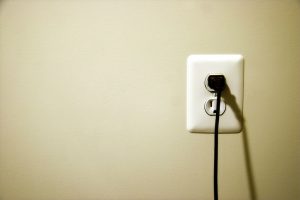
What does it mean to have your house grounded? We could go into some lengthy engineering explanations about how electricity works, but we can provide a simpler discussion of the electrical flow in your house. Electricity is always trying to “ground,” which means it gets rid of all its negative energy so it can get back to being balanced. In your home, the way the electrical systems allow electricity to return to ground is through the neutral wires. The “hot” wires carry the negative half of the polarized charge of electricity, and the neutral wires contain the positive half. These wires run next to each other through your electrical system.
For an example of this standard grounding at work, look at an outlet. One slot is the “hot” side, and the other is the “neutral.” The current flows through the hot side and then into the neutral side to eliminate the negative energy.
Grounding for a House Is an Alternate Path of Electricity
What happens if something goes wrong with your electrical wiring set up? For example, a short-circuit occurs because of frayed wiring and electricity escapes from one wire to leap to another wire. In this case, the electricity is taking a short-cut to reach the ground. This is where grounding the home is useful, because it offers a safe alternate route for the electricity to reach the ground without creating electrical hazards like high voltage shocks and fires. You give electricity an easier route that’s also a safer route, and the electricity will take it.
Your home may already be grounded. The way to check is to look at one of the outlets. The third slot, the one below the hot and neutral slots, is the grounding slot. The wiring for this slot connects to the copper grounding wires, so in case of an electrical short, the electricity has a safe pathway to reach the ground and eliminate its negative energy.
If You Don’t Have Grounded Outlets
Wiring systems for older homes, such as those built before 1965, may not have any grounding path at all. If you live in a home where all the outlets are still two-pronged, your house may not have any grounding. (As we’ve discussed in a previous post, using three-prong adapters is not a solution to this; you still won’t have grounded outlets.)
Homes built before 1965 may be grounded, but instead of the copper wires used today, they use less effective metal conduits or metal cables. If your home is this vintage, we recommend you call on an Orchard Park, NY electrician to see if you need upgrades and grounding for the house. We strongly recommend making the upgrade to grounded three-prong outlets if your house does not currently have them.
Another job we recommend for these older houses with either no grounding or outdated grounding is to have a replacement electrical panel put in. This is especially important if the house uses a fuse box rather than a breaker panel. You can trust our electricians to provide you with the best solutions for modernizing your electrical system for safety and effectiveness.
Scherer Electric is Western New York’s Favorite Electrician. Call us today for the electrical services your home needs.





